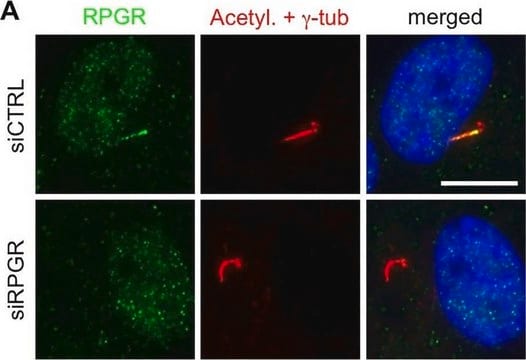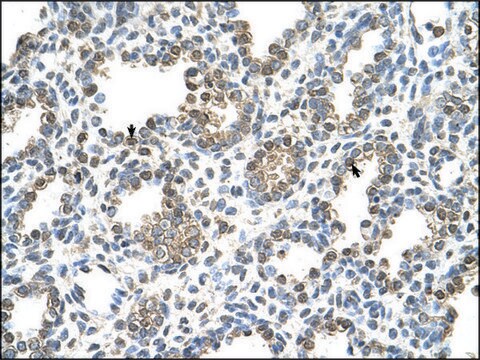推荐产品
生物源
rabbit
共軛
unconjugated
抗體表格
affinity isolated antibody
抗體產品種類
primary antibodies
無性繁殖
polyclonal
產品線
Prestige Antibodies® Powered by Atlas Antibodies
形狀
buffered aqueous glycerol solution
物種活性
human
加強驗證
recombinant expression
Learn more about Antibody Enhanced Validation
技術
immunoblotting: 0.04-0.4 μg/mL
immunohistochemistry: 1:500-1:1000
免疫原序列
VVVGFDPHFSYMKLTKALRYLQQPGCLLVGTNMDNRLPLENGRFIAGTGCLVRAVEMAAQRQADIIGKPSRFIFDCVSQEYGINP
UniProt登錄號
應用
research pathology
運輸包裝
wet ice
儲存溫度
−20°C
目標翻譯後修改
unmodified
基因資訊
human ... PGP(283871)
一般說明
Phosphoglycolate phosphatase (PGP) is a ubiquitously expressed enzyme that belongs to the haloacid dehalogenase (HAD)-type superfamily. PGP gene is localized on human chromosome 16p13.3.
免疫原
phosphoglycolate phosphatase recombinant protein epitope signature tag (PrEST)
應用
All Prestige Antibodies Powered by Atlas Antibodies are developed and validated by the Human Protein Atlas (HPA) project and as a result, are supported by the most extensive characterization in the industry.
The Human Protein Atlas project can be subdivided into three efforts: Human Tissue Atlas, Cancer Atlas, and Human Cell Atlas. The antibodies that have been generated in support of the Tissue and Cancer Atlas projects have been tested by immunohistochemistry against hundreds of normal and disease tissues and through the recent efforts of the Human Cell Atlas project, many have been characterized by immunofluorescence to map the human proteome not only at the tissue level but now at the subcellular level. These images and the collection of this vast data set can be viewed on the Human Protein Atlas (HPA) site by clicking on the Image Gallery link. We also provide Prestige Antibodies® protocols and other useful information.
The Human Protein Atlas project can be subdivided into three efforts: Human Tissue Atlas, Cancer Atlas, and Human Cell Atlas. The antibodies that have been generated in support of the Tissue and Cancer Atlas projects have been tested by immunohistochemistry against hundreds of normal and disease tissues and through the recent efforts of the Human Cell Atlas project, many have been characterized by immunofluorescence to map the human proteome not only at the tissue level but now at the subcellular level. These images and the collection of this vast data set can be viewed on the Human Protein Atlas (HPA) site by clicking on the Image Gallery link. We also provide Prestige Antibodies® protocols and other useful information.
生化/生理作用
Phosphoglycolate phosphatase (PGP) protein displays maximal activity in cardiac and skeletal muscles. It regulates oxygen transport by modulating 2,3-diphosphoglycerate in red blood cells (RBCs). PGP functions as a glycerol-3-phosphate (Gro3P) phosphatase and controls metabolic functions in pancreatic β-cells and hepatocytes especially carbohydrate and lipid metabolism. It is crucial for metabolite repair and regulates the levels of 2-phosphoglycolate, 2-phospholactate, and a few more metabolites. This enzyme from P. falciparum enables the detoxification of 4-phosphoerythronate (4-PE). Inactivation or reduction of PGP leads to an elevation in triglyceride levels due to decreased triosephosphate isomerase activity.
特點和優勢
Prestige Antibodies® are highly characterized and extensively validated antibodies with the added benefit of all available characterization data for each target being accessible via the Human Protein Atlas portal linked just below the product name at the top of this page. The uniqueness and low cross-reactivity of the Prestige Antibodies® to other proteins are due to a thorough selection of antigen regions, affinity purification, and stringent selection. Prestige antigen controls are available for every corresponding Prestige Antibody and can be found in the linkage section.
Every Prestige Antibody is tested in the following ways:
Every Prestige Antibody is tested in the following ways:
- IHC tissue array of 44 normal human tissues and 20 of the most common cancer type tissues.
- Protein array of 364 human recombinant protein fragments.
聯結
Corresponding Antigen APREST82346
外觀
Solution in phosphate buffered saline, pH 7.2, containing 40% glycerol and 0.02% sodium azide.
法律資訊
Prestige Antibodies is a registered trademark of Merck KGaA, Darmstadt, Germany
免責聲明
Unless otherwise stated in our catalog or other company documentation accompanying the product(s), our products are intended for research use only and are not to be used for any other purpose, which includes but is not limited to, unauthorized commercial uses, in vitro diagnostic uses, ex vivo or in vivo therapeutic uses or any type of consumption or application to humans or animals.
Not finding the right product?
Try our 产品选型工具.
儲存類別代碼
10 - Combustible liquids
水污染物質分類(WGK)
WGK 1
閃點(°F)
Not applicable
閃點(°C)
Not applicable
De novo 16p13. 3-p12. 3 duplication in a child with syndromic developmental delay
Duarte-Bueno LM, et al.
Gene Reports, 20 (20)
Laure Dumont et al.
mBio, 10(6) (2019-12-12)
Members of the haloacid dehalogenase (HAD) family of metabolite phosphatases play an important role in regulating multiple pathways in Plasmodium falciparum central carbon metabolism. We show that the P. falciparum HAD protein, phosphoglycolate phosphatase (PGP), regulates glycolysis and pentose pathway
Gabriela Segerer et al.
Scientific reports, 6, 35160-35160 (2016-10-13)
Mammalian phosphoglycolate phosphatase (PGP) is thought to target phosphoglycolate, a 2-deoxyribose fragment derived from the repair of oxidative DNA lesions. However, the physiological role of this activity and the biological function of the DNA damage product phosphoglycolate is unknown. We
Gabriela Segerer et al.
Biochimica et biophysica acta. Molecular and cell biology of lipids, 1863(6), 584-594 (2018-03-11)
Mammalian phosphoglycolate phosphatase (PGP, also known as AUM or glycerol-3-phosphate phosphatase) is a small molecule-directed phosphatase important for metabolite repair and lipid metabolism. Although PGP was first characterized as an enzyme involved in epidermal growth factor (EGF) signaling, PGP protein
我们的科学家团队拥有各种研究领域经验,包括生命科学、材料科学、化学合成、色谱、分析及许多其他领域.
联系技术服务部门









